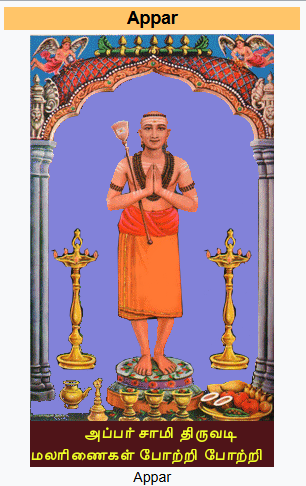Thirunavukkarasar
-
Converted from Jainism to Shaivism.
-
Known for his deep philosophical hymns and humility.
-
His name means "King of the Tongue" (for his eloquence in Tamil).
-
Lived before or around the time of Sambandar.

Background and Early Life
Thirunavukkarasar Nayanar
Appar was born in the town of Tiruvamur in the Chozha kingdom. His birth name was Marulneekkiyar. He came from a family of non-Brahmin community. Sadly, he lost his parents early in life. His older sister, Thilagavathiyar, raised him with deep devotion to Lord Shiva. However, a significant turning point in his early life occurred when he became disillusioned with Shaivism and converted to Jainism. He became a respected Jain monk, known for his scholarship and spiritual discipline, and was called Dharmasenar. His sister, who remained a lasting devotee of Shiva, was heartbroken by his conversion and continuously prayed for his return to Shaivism.
Thilagavathiyar's unwavering prayers eventually bore fruit. Her brother, Dharmasenar, fell gravely ill with a severe stomach ailment that no Jain medicine or penance could cure. Seeing his suffering, his sister urged him to pray to Lord Shiva. Desperate and in immense pain, Dharmasenar secretly returned to the Shiva temple where his sister worshipped. Thilagavathiyar applied holy ash to his body and prayed to Shiva for his healing. Miraculously, as soon as the sacred ash was applied, Dharmasenar's excruciating pain vanished. This miraculous recovery, after years of suffering and failed Jain remedies, solidified his faith in Shiva. He renounced Jainism completely and joyfully returned to Shaivism, becoming known as Thirunavukkarasu, meaning "Lord of divine speech," because of the hymns he began to compose
His reconversion to Shaivism angered the Jains who had been influential at the court of the Pallava king, Mahendravarman I. They instigated the king to persecute Appar. Appar faced numerous cruel trials: he was thrown into a lime kiln (a hot oven), but emerged unharmed; he was fed poisoned rice, which did not affect him; and he was tied to a stone and thrown into the sea, yet he floated to shore, guided by the five sacred letters of Shiva's name (Namah Shivaya) which he chanted. Each time, he emerged miraculously unscathed, singing hymns praising Shiva's protection. Witnessing these repeated miracles, King Mahendravarman I was deeply moved. He realized the power of Shiva and the greatness of Appar. The king himself converted from Jainism to Shaivism, becoming a great devotee and patron of Shiva temples.
Journey and Companions
After overcoming the intense persecutions orchestrated by the Jains, Appar dedicated the rest of his long life to extensive pilgrimages across Tamil Nadu. He visited countless Lord Shiva temples, often performing the arduous act of uzhavara pani. This involved using a small shovel to clear away weeds, thorns, and debris from temple grounds, a humble act of service that became synonymous with his devotion. As he traveled, he composed thousands of deeply moving hymns, which are now compiled in the Tevaram (specifically the fourth, fifth, and sixth Tirumurais). These hymns are celebrated for their simple yet profound language, making complex spiritual truths about Shiva accessible to everyone. They reflect Appar's intense personal devotion and his emphasis on selfless service to the Lord and His devotees. He frequently referred to himself as a "servant" of Shiva. Appar also shared a significant spiritual connection with the young saint Tirugnana Sambandhar. Despite their age difference, they traveled together, engaging in debates against other faiths and working to spread the Shaiva tradition.
Legacy and Contributions
Appar's contributions to Shaivism are immense and enduring. His life story, particularly his miraculous survivals from persecution, played a pivotal role in the conversion of the powerful Pallava King Mahendravarman I, which significantly boosted the Shaiva faith in the region. His hymns, still sung daily in Shiva temples and homes, form a foundational pillar of Tamil devotional music and literature. They continue to inspire millions with their powerful expressions of love for God and their emphasis on the path of Bhakti (devotion) and selfless service. Appar's personal example of humility, resilience, and unwavering faith, even in the face of extreme adversity, has cemented his place as one of the most beloved and respected figures in the history of Hinduism. He lived a long life dedicated entirely to devotion and service, eventually merging with Lord Shiva at the temple in Tiruppugalur, achieving ultimate liberation.
Create Your Own Website With Webador